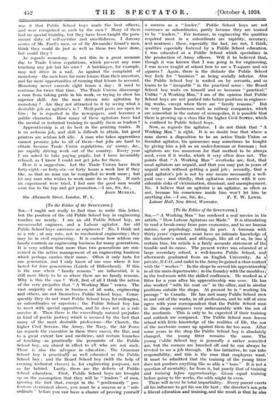[To the Editor of the SPECTATOR.] SIR,—I ought not really
to find time to write this letter, but the position of the old Public School boy in engineering touches me nearly. I am an old Public School boy, an unsuccessful engineer, and a Labour agitator. Are old Public School boys successes as engineers ? No, I think not as a rule ; at any rate, not in mechanical engineering ; they may be in civil engineering. It is curious how seldom one family controls an engineering business for many generations. It is very seldom that more than two generations are con- cerned in the active management of an engineering business which perhaps carries their name. Often it only lasts for one generation, and I only know of one case where it has lasted for four generations (Lairds of Birkenhead). If this is the case where " family reasons " are influential, it is still more likely to be so where there are no family reasons. "Why is this the ease ? Well, first of all I think the action of the very prejudice that " A Working Man " voices. The vast majority of men in business of all sorts, engineering and others, are not themselves Public School boys. Conse- quently they do not want Public School boys for colleagues, or subordinates or superiors : the Public School boy has to meet with special opposition, and he does not as a rule survive it. Then there is the exceedingly natural prejudice (a kind of poetic justice) which is aroused by the fact that many of the most desirable professions—the Church, the higher Civil Service, the Army, the Navy, the Air Force (as regards the executive in these three cases), the Bar, and
to a great extent law and medicine, and certain branches of teaching—as practically the perquisite of the Public School boy, are closed in effect. to all who are not such. There is also the advance in education. .The Grammar School boy is practically as well educated as the Public School boy ; and the Board Schobl boy (with the help of evening technical classes) is, for engineering purposes, not so far behind. Lastly, there are the defects of Public School education. First, Public School boys are brought up on the assumption that they will be " leaders " of men, ignoring the fact that, except in the " gentlemanly " pro- fessions mentioned above, you must be a success as a " sub- ordinate " before you can have a chance of proving yourself a success as a ".leader." Public School boys are not successes as subordinates, partly because they are trained to be " leaders." For instance, in engineering the qualities
required most in a subordinate are rapidity, accuracy, and neatness : these, especially the last, are not, I think, qualities especially fostered by a Public School education. I was educated at a Public School which specializes in the production of Army officers. Will it be believed that, though it was known that I was going in for engineering, I was never taught at school how to use a T-square and set squares ? Again, there is the distaste the Public School boy feels for " business " as being socially inferior. Also the Public School boy is waited on by servants, and so learns to be " incapable " in the practical sense : the Board School boy waits on himself and so becomes " practical." Unlike " A Working Man," I am of the opinion that Public School boys are not pushed into better positions in engineer- ing works, except when there are " family reasons." But in very large businesses such as railway companies, which are somewhat in the nature of monopolies, it is possible that there is growing up a class like the higher Civil Service, which is confined to Public School boys.
• Now, as regards the agitator. I do not think that " A Working Man " is right. It is no doubt true that where a man shows a disposition to be an active Trade Union or Socialist agitator, his quiescence may sometimes be bought by giving him a job as an under-foreman or foreman ; but agitators are too numerous for that method to be always used, even if it works, which it very often does not. The points that " A Working Man " overlooks are, first, that most agitators are unpaid, and that you may put in years of unpaid work without getting a paid job ; secondly, that a paid agitator's job is not by any means necessarily a well- paid one ; and thirdly, that agitation carries with it con- siderable risks of victimization, dismissal, and unemployment. No. I believe that an agitator is an agitator, as often as not, because his conscience inside him won't let him be


















































 Previous page
Previous page